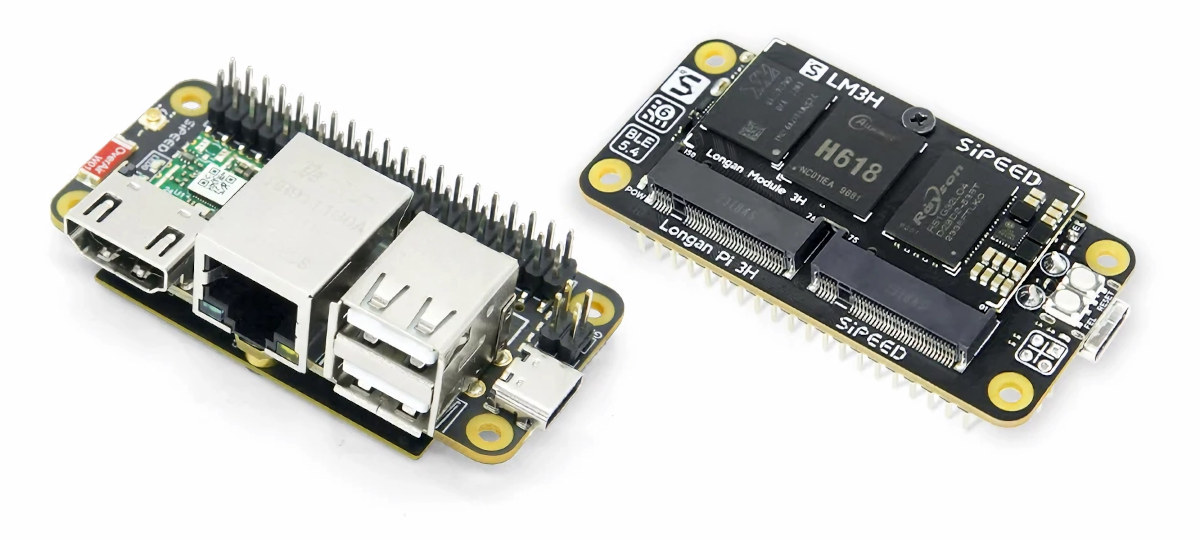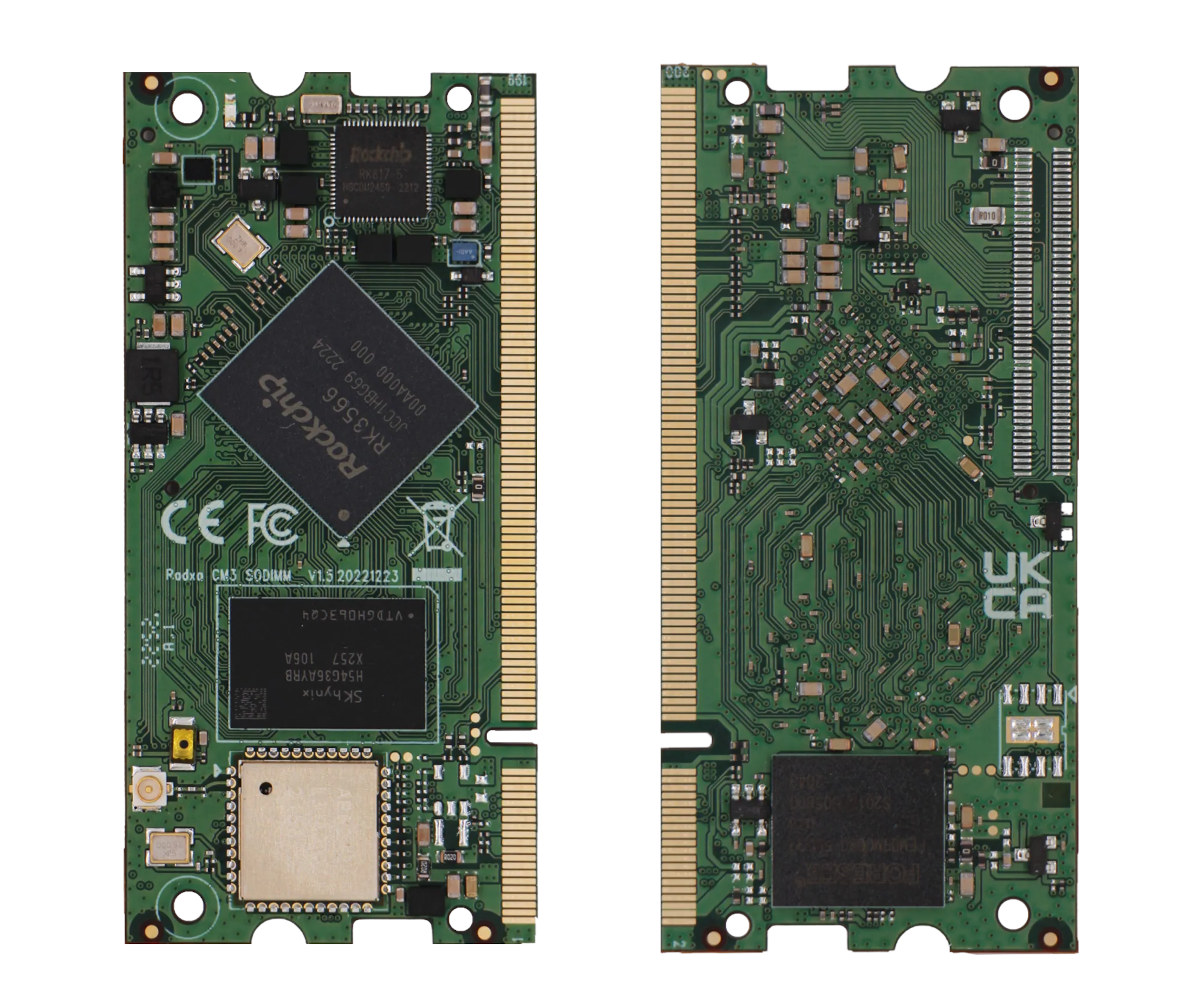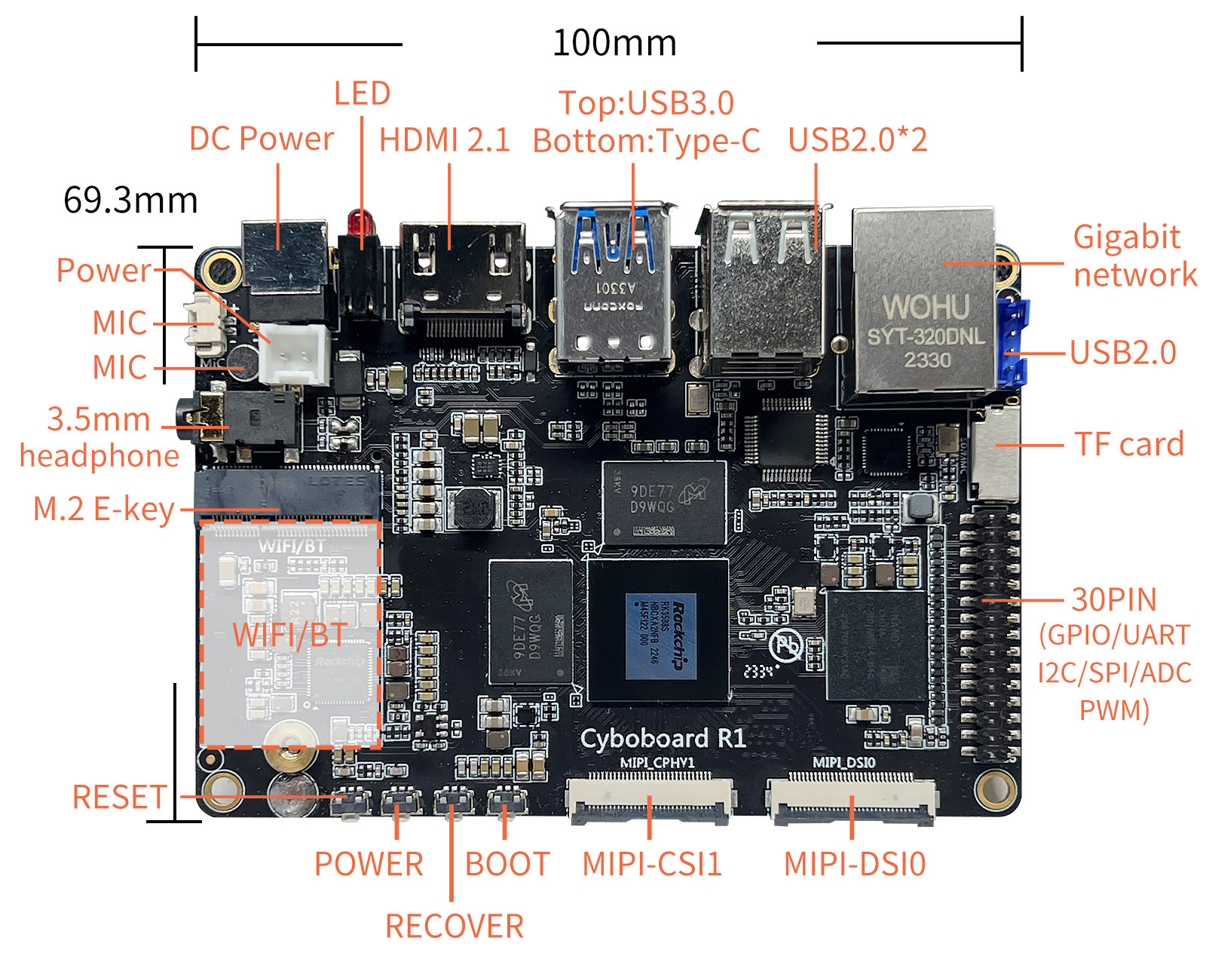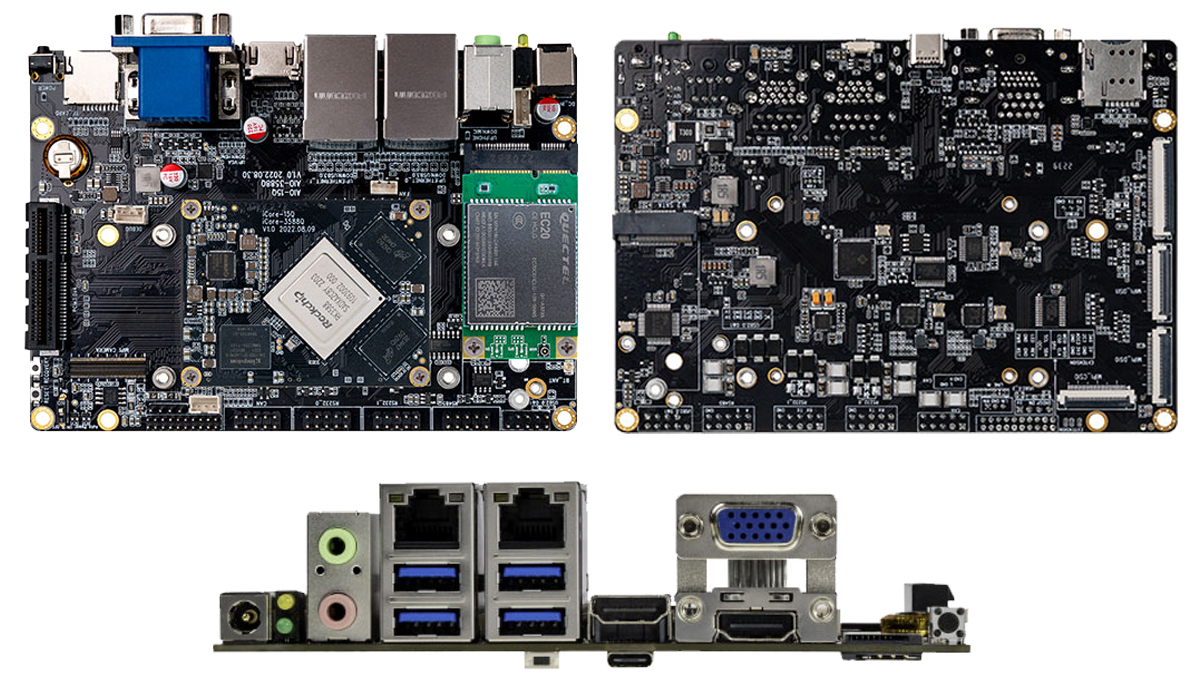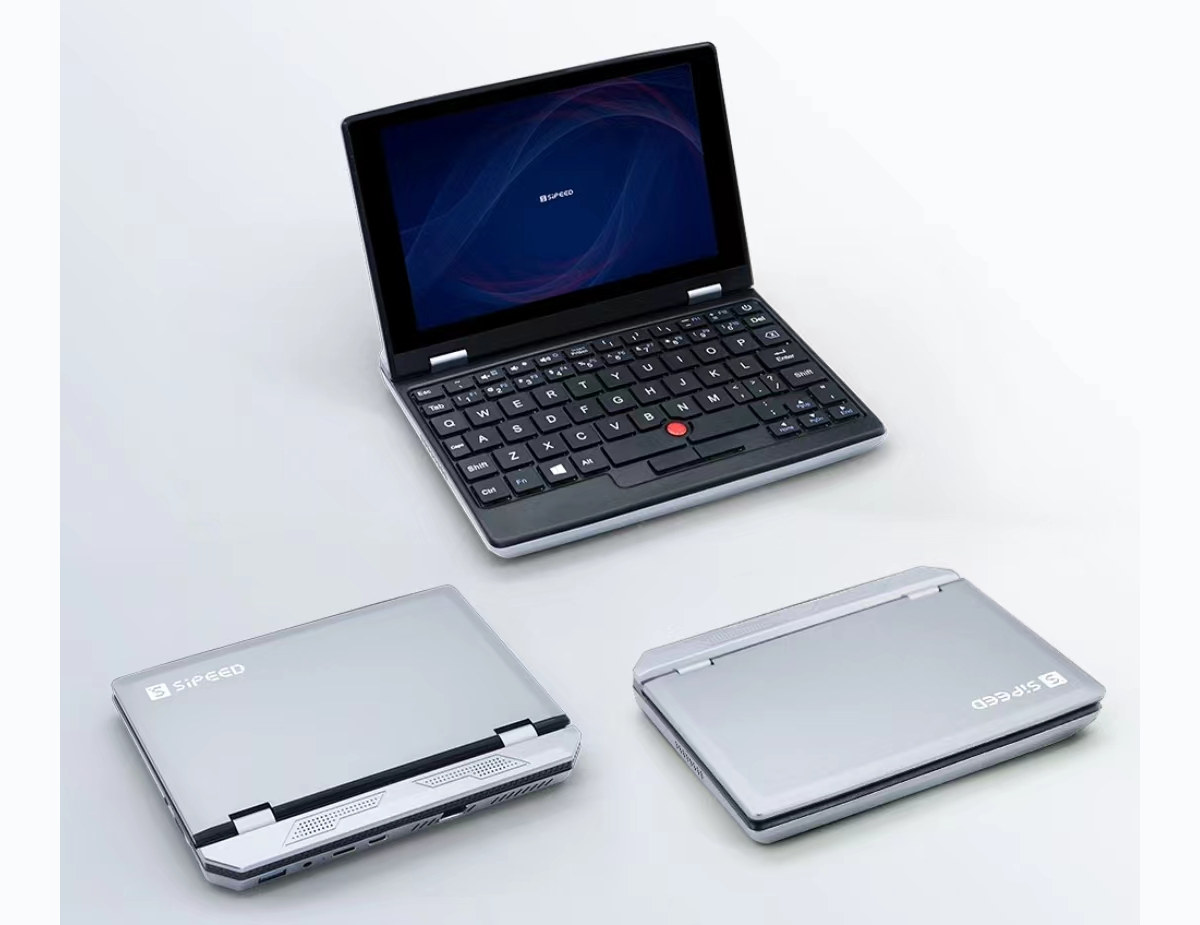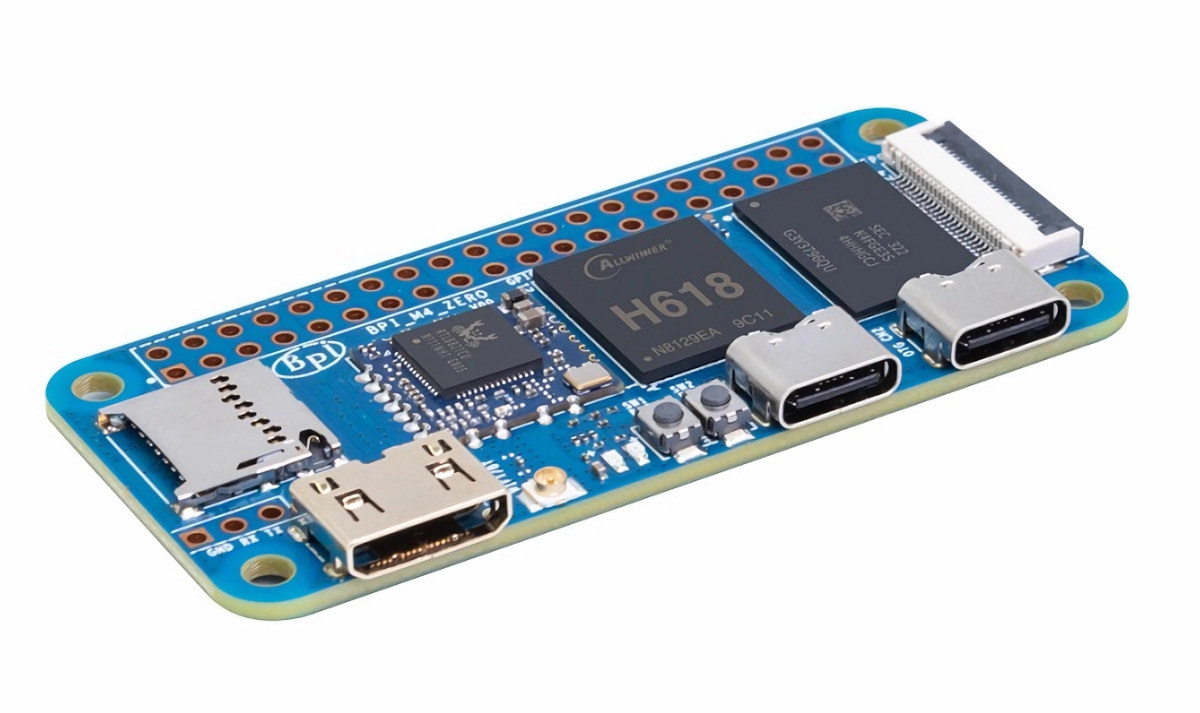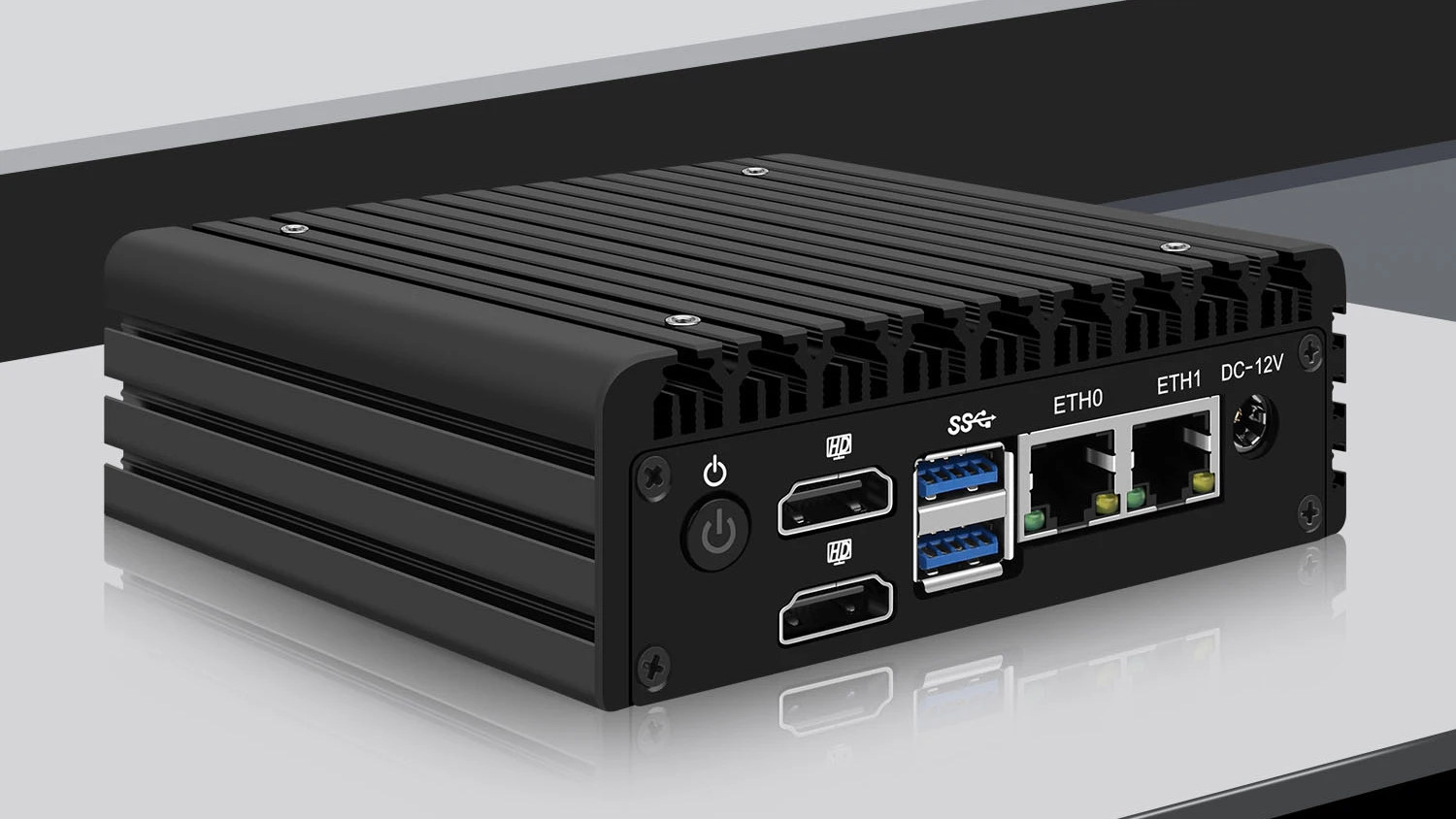Sipeed Longan Pi3H is a Raspberry Pi Zero-sized single board computer (SBC) powered by an Allwinner H618 quad-core Cortex-A53 processor and equipped with full-size connectors namely an HDMI 2.0 video output, two USB 2.0 Type-A ports, and a gigabit Ethernet RJ45 jack. It also offers WiFi 6 and Bluetooth 5.4 connectivity, features the usual 40-pin GPIO header found in Pi Zero boards and relies on a USB OTG Type-C port for power. Its design is unusual for a board of that size, not only because of the full-size ports, but also because it’s comprised of a carrier board and a replaceable LM3H CPU module with the Allwinner H618 SoC, RAM, and eMMC flash. Sipeed Longan Pi3H specifications: SoC – Allwinner H618 CPU – Quad-core Arm Cortex-A53 processor @ up to 1.5GHz with 1MB L2 cache GPU – Arm Mali-G31 MP2 GPU with support for OpenGL ES 1.0/2.0/3.2, OpenCL 2.0, Vulkan […]
Radxa CM3S Rockchip RK3566 SODIMM system-on-module supports up to 8GB RAM, 128GB flash, wireless module
Radxa CM3S (Compute Module 3 SODIMM), also called the ROCK3 Compute Module SODIMM, is a system-on-module with a 200-pin SO-DIMM edge connector powered by a Rockchip RK3566 processor with up to 8GB RAM, 128GB eMMC flash, and an optional wireless module with WiFi 4 and Bluetooth 4.2. It follows the company’s CM3 module with Raspberry Pi CM4 form factor based on the same Rockchip RK3566 SoC, but in a more compact SO-DIMM form factor with a 200-pin edge connector that’s compatible with the Raspberry Pi Compute Module 3/3+, but not compatible with NVIDIA’s Jetson Nano, Xavier NX, and Orin NX 260-pin SO-DIMM modules, and you’d need to wait for the upcoming Radxa NX5 instead… Radxa CM3S specifications can be found below along with the ones for the Radxa CM3 and Rockchip RK3568-based Radxa CM3I system-on-modules. Note that some of the specifications differ depending on where you look on the Radxa […]
GlowStitch LEDs – A machine-sewable LED board for adding lights to wearables and crafts (Crowdfunding)
GlowStitch LEDs is an innovative new project that is aimed at making machine-sewable LEDs for wearable tech and special crafts of all forms. The LEDs are made from flexible circuit boards which makes them sewable with a machine and usable for various creative projects by makers, cosplayers, fashion designers, and hobbyists. Until now, sewing LEDs to clothing and soft circuits (e-textiles) had to be done by hand with conductive thread, an arduous process that requires a lot of patience. With the GlowStitch LEDs, creative projects can be prototyped using conductive tape and actualized with a sewing machine. This project has a focus on education and the kit is designed to be used by makers of all skill levels. The LED strips can be machine-washed. However, the maker recommends hand-washing with no tumble dry. The battery should always be removed before washing. Although this is not a kit that requires coding […]
Youyeetoo R1 – A feature-rich Rockchip RK3588S SBC with M.2 sockets, NFC, etc.. for $99 and up
Youteetoo Cyboboard R1, or just Youyeetoo R1 for shorts, is a Rockchip RK3588S SBC that packs quite a lot of features in a 100×69.3mm form factor with two M.2 sockets for NVME/SSD or 4G LTE, and WiFi and Bluetooth connector, support for NFC, four display interfaces, two MIPI CSI camera interfaces and more. The board is offered with up to 32GB RAM and 256GB eMMC flash, and also comes with a gigabit Ethernet port, five USB interfaces, a built-in microphone, several audio inputs/outputs, a 30-pin header for expansion, and it can support HDMI input via an adapter connected to one of the MIPI CSI ports. Youyeetoo R1 specifications: SoC – Rockchip RK3588S CPU – Octa-core processor with 4x Cortex-A76 cores @ up to 2.2-2.4 GHz, 4x Cortex-A55 cores @ up to 1.8 GHz GPU – Arm Mali-G610 GPU with OpenGL ES 3.2, OpenCL 2.2, and Vulkan 1.2 support VPU – […]
Firefly AIO-3588Q 8K AI Board Features Octa-Core CPU and 6 TOPS NPU
Firefly has recently launched the AIO-3588Q 8K AI board powered by a powerful Rockchip RK3588 SoC, up to 32GB of RAM, 8K video encoding-decoding, Gigabit Ethernet, Wi-Fi 6, 5G/4G, and multiple display support. With all these features this board is designed to target the industrial, commercial, and automotive markets. Previously, we have covered many SBCs and SoMs designed by Firefly such as the similarly named Firefly AIO-3588SG; feel free to check those out if you’re interested. Features and specifications of the AIO-3588Q 8K AI Board: SoC – RockChip RK3588: CPU – Octa-core 64-bit (4x Cortex-A76+4x Cortex-A55), 8nm process, up to 2.4GHz. GPU – ARM Mali-G610 MP4, supports OpenGL ES3.2/OpenCL 2.2/Vulkan1.1, 450 GFLOPS. NPU – Up to 6 TOPS, supports INT4/INT8/INT16, compatible with TensorFlow/MXNet/PyTorch/Caffe. ISP – Integrated 48MP ISP with HDR & 3DNR. VPU – Supports 8K @ 60fps and 4K @ 60fps video decoding/encoding, including H.265/VP9/AVS2, and H.264 AVC/MVC. RAM […]
Lichee Console 4A RISC-V mini laptop sells for $252 and up
Sipeed Lichee Console 4A is a RISC-V portable Linux console, that I would also call a RISC-V mini laptop, powered by an Alibaba T-Head TH1520 quad-core C910 processor and equipped with up to 16GB RAM and 128GB eMMC flash. We first covered the device last August, but Sipeed had started taking pre-ordered by the end of October, and they’ve gone through the first batch of mass production, and should soon ship the mini laptops with the Aliexpress store showing December 31 as the release date, and we’re told some samples may have already been shipped in the first part of the month. Lichee Console 4A specifications: SoM – Replaceable Lichee LM4A system-on-module based on TH1520 quad-core RISC-V C910 processor with up to 16GB LPDDR4X, 128GB eMMC flash Storage – MicroSD card slot, M.2 SSD support Display – 7-inch 1280 x 800 LCD with capacitive touch Video Output – 1x mini […]
Banana Pi BPI-M4 Zero Allwinner H618 SBC follows Raspberry Pi Zero 2 W form factor
Banana Pi BPI-M4 Zero is another Raspberry Pi Zero 2 W alternative with an Allwinner H618 quad-core Arm Cortex-A53 processor, 2GB LPDDR4, 8GB eMMC flash, mini HDMI video output, two USB-C ports, WiFi 5 and Bluetooth 4.2 wireless connectivity and the usual 40-pin GPIO header as well as a 24-pin “Misc” FPC header. It succeeds the Banana Pi BPI-M2 Zero launched in 2017 with an Allwinner H2+ quad-core Cortex A7 processor with basically the same form factor but a more powerful 64-bit Arm processor, more memory (2GB vs 512MB), built-in eMMC flash, dual-band WiFi 5, and the 24-pin MIPI CSI connector is now a “Misc” connector with USB 2.0, Fast Ethernet, and other I/Os. Banana Pi BPI-M4 Zero specifications: SoC – Allwinner H618 CPU – Quad-core Arm Cortex-A53 processor @ up to 1.5GHz with 1MB L2 cache GPU – Arm Mali-G31 MP2 GPU with support for OpenGL ES 1.0/2.0/3.2, OpenCL […]
CWWK x86-P5 fanless mini PC with two 2.5GbE ports ships with up to Intel Core i3-N305 CPU
CWWK x86-P5 is a fanless mini PC powered by an Intel Alder Lake N-series N100 (quad-core) or Core i3-N305 (octa-core) and equipped with two 2.5GbE ports using Intel i226V controllers making it suitable for networking applications such as a firewall or a soft router. But it’s also a standard mini PC with two HDMI 2.0 ports, two USB 3.2 ports, and up to four USB 2.0 ports making it a candidate to run Promox with both a desktop OS like Windows 11 or Ubuntu 22.04 and a networking OS such as pfSense or OpenWrt. CWWK x86-P5 specifications: Alder Lake-N SoC(one or the other) Intel Processor N100 quad-core processor @ up to 3.4 GHz (Turbo) with 6MB cache, 24EU Intel UHD graphics; TDP: 6W Intel Core i3-N305 octa-core processor @ up to 3.8 GHz (Turbo) with 6MB cache, 32EU Intel UHD Graphics; TDP: 15W System Memory – Up to 32GB DDR5 […]


